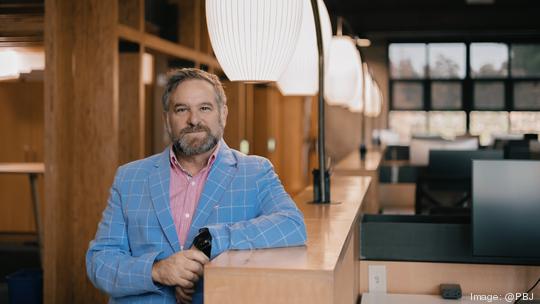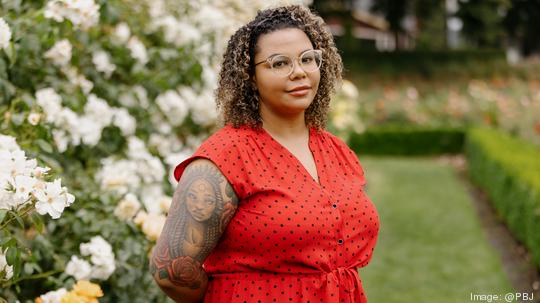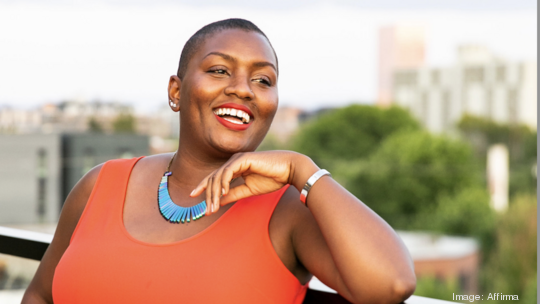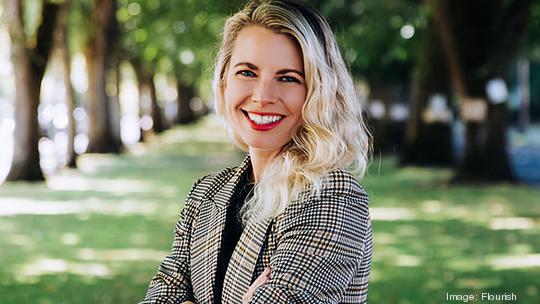
Portland-based advertising agency Owen Jones and Partners launched a diversity, equity and inclusion effort in 2018, sparked by a senior leader who wanted to make it a company focus. Soon after, the agency conducted a salary audit.
Senior executives were stunned by the wage gaps it revealed.
“It was kind of shocking to look at that because we are not those people. But numbers don’t lie. We were those people. So we took steps to fix that,” said Owen Jones CEO and CFO David Lowe-Rogstad, who at the time was the agency’s president.
The audit and the company's cultural shift making equity and inclusion its foundation is a leap forward for the 20-year-old agency run by co-founder Rusty Grim and Lowe-Rogstad, both cisgender, straight, white men.
“I will be totally transparent, we, like probably many organizations, spent a lot of years as well-meaning white people but not really understanding the work,” Lowe-Rogstad said.
The decision to focus on equity and inclusion wasn’t difficult, Lowe-Rogstad said. But what has come after has been.
The agency's tagline is “show, don’t tell.” In the beginning, Lowe-Rogstad said Owen Jones was doing a lot of telling and not so much showing when it came to creating an equitable and inclusive workplace.
To change that, the company has done a lot of education with its leaders and worked with external organizations and consultants to guide the work. An early lesson for Lowe-Rogstad was the power of listening to people from historically marginalized backgrounds and those who have different lived experiences.
“I can’t ask somebody else to bring me along,” he said. “It’s really been valuable to sit and listen and be present.”
That has meant being intentional about the people he surrounds himself with and the rooms in which he shows up. It has meant sometimes pausing internal policy discussions to consider: “what does this (policy) mean for the least powerful voice in the room?”
For instance, how will hybrid work policies affect junior staff members, who might have less control over their schedules than their more senior colleagues.
“I need the system to work for everybody,” Lowe-Rogstad said.
Today, Owen Jones does regular salary audits to help ensure equity. It also has policies in place to maintain that as the agency grows past 100 employees. The company has roughly 70 employees today. The work is ongoing. The focus now is on retention and ensuring that once people are hired, they can be themselves and there are opportunities for career advancement.
“Philosophically, I’ve come to the position that I want us to focus on the equity piece and the inclusion piece,” he said. “To me diversity is a goal but not the tactic.”
Owen Jones now has six employee resource groups, including Black employees of Owen, a BIPOC group, and Mothers of Owen.
Transparency and accountability are key. Lowe-Rogstad said problems can take root when either of those slip. Vulnerability from leaders and taking responsibility when things go wrong, because they will, are important, too. Leaders can't just promise to be better.
“What does better look like?” he said. “I try to (say), here’s what change is going to look like, here’s the timeframe. And if we’re not going to make that timeframe, we’re going to be honest about it. Try to be less excuse focused and more here’s how we are pivoting or adapting.”
The efforts have shown up in the demographics, which are closely tracked.
- Executive leadership: 50% identify as women, 25% Black, indigenous or people of color
- Senior non-executive leadership: 50% identify as women, 25% BIPOC
- Overall staff: 50% non-male identifying, 30% BIPOC
Lowe-Ronstad’s advice to other executives: “Don’t outsource the work. You’ve got to do the work yourself. You’ve got to be a champion of it.”
Lowe-Rogstad's evolution as a leader has been enabled by a handful of organizations, consultants and the people he surrounds himself with. The agency is a member of Partners in Diversity and Lowe-Rogstad has participated in the group’s Leadership Cohort. Owen Jones works closely with Affirma, an HR consultancy, and with the equity and inclusion training firm Flourish.
To get a deeper sense of what's worked at Owen Jones, the Business Journal connected with the agency’s partners. Here’s what they had to say.
Partners in Diversity Leadership Cohorts
Once a quarter for two-and-half hours, DEI consultant Alexis Braly James meets with a small group of CEOs or executive managers. The focus: How can their companies move the needle in social justice equity.
The discussions are part of a Partners in Diversity program called Leadership Cohorts. Partners in Diversity is a nonprofit that hosts networking events for professionals of color and educational workshops to help companies build equitable and inclusive workforces.
There are two CEO Leadership Cohorts, grouped by company size, and one cohort for executive managers. This is the third year of the program and 95 executives have participated.

The sessions provide a safe space where executives can problem solve their bias and issues without direct reports watching. In that vulnerability, Braly James said, is where learning can happen.
“I think most CEOs have some sort of professional development they are in but this one is specifically focused on social justice and DEI in the workplace,” she said.
Owen Jone's David Lowe-Rogstad was in the 2021 CEO cohort, with other executives leading companies with 50 to 100 employees. Like Lowe-Rogstad the executives who participate already understand the importance of inclusion and equity in their workforce, Braly James said. The program helps them get there.
Together, the executives work through DEI-related challenges they've experienced in the past quarter. They also share successes and ideas and help each other refine strategies.
Individual goals are set at the beginning and are referenced constantly. For example, if someone’s goal is to diversify the workforce, the group talks about the nuts and bolts of making that happen, such as refining performance plans and focusing on retention. But, the conversations go deeper, getting at the “why?” behind the goal, and exploring the opportunities and challenges presented by a company's industry or line of work.
“Because that’s not always clear. Like for a marketing agency, it’s very much the team inside but it’s also so that the team inside can (help) clients see where they might be missing perspective,” Braly James said. For instance, she added, how many times have ad campaigns come under fire for being problematic when trouble could have been avoided by having more perspectives in the room in the planning stage.
“But, that isn’t the case for a construction company, where they are looking at not only their internal team but they also want to change the construction industry (as a whole),” she said.
Curriculum includes best practices on policy statements and employee resource groups, and more challenging topics such as how to interrupt white supremacy in the workplace. Executives write and reflect on their own personal race story, set accountability goals and learn about managing change through an equity lens.
The peer learning can make the journey a lot less lonely for people.
“Sometimes leaders come into those meetings and they’ve been exhausted by the work and they’re ready to tap out,” she said. “And then they hear something from their peers and it relights their ignition and they’re ready to re-engage. When a CEO disengages from the conversation, or deprioritizes (DEI), the impact never gets there.”
The majority of CEO participants are heterosexual, cis white men, said Braly James, who also has a consulting firm called Construct the Present. It’s a reflection of the reality of who is in charge in most organizations.
The companies that see progress on DEI, like Owen Jones, are the ones where the CEO empowers the strategy execution team with resources and removes barriers to achieving equity and inclusion goals, she said.
This year’s Leadership Cohorts just started. Signups are happening now for another round that begins in December.
The intersection of HR and DEI
Tia Coachman, founder of bespoke HR consultancy Affirma, says there is no disentangling DEI from human resources.
“I live at so many intersections myself. I am Black, I am a woman, I am a queer woman, I am a mother of two Black boys in the Pacific Northwest. I am an HR leader in an industry dominated by white women and dictated by white men,” she said. “I live at so many intersections there is no way that I could do (HR) without centering equity.”
Coachman has brought that embedded equity work to a three-year partnership with Owen Jones. She initially helped the advertising agency build its human resources practice. They are now building on that foundation by looking at performance reviews, salary and compensation packages, and creating community, she said.

Coachman said part of her role at Owen Jones is helping them problem solve and holding their hands as they learn and change.
She focuses on the four “P’s”: programs, practices, policies and processes. She helps clients identify inconsistencies, gaps and inequity in those areas across the intersections of identity. For instance, look at who is coming in an organization, who is going out, how long are people staying, how quickly are people moving up? And who are those people; look at the demographics of each to see spot trends.
A client like Owen Jones, with a long-term commitment, is ideal.
“I have seen them embrace change. I have seen them experience conflict and I have seen them approach it with the mindset that this isn’t the end of the world, there is responsibility that all parties have to take in it and let's move forward,” she said. “Sometimes forward movement is slow and sometimes that forward movement is fast, but they are one of the agencies that moves.”
Coachman spent decades working in internal HR organizations, across industries, including advertising. She sees the combination of a committed internal structure with an external partner as a path to success.
“If you have decided to be the doer of this work to move it forward then get a consultant that’s going to be with you every step of the way as you are doing it. Ask for help. And then realize this (equity work) has to be of you as an organization,” she said. “Because if it is not of you, for your people, it isn’t going to be sustainable.”
Neurology of equity
Amy Jeffers, founder of Flourish, specializes in DEI training grounded in human neurology.
That is, training grounded in what is happening in the brain around fight or flight, how we perceive and express emotion as threats or rewards, and how all of that contributes to how we interact with peers.
Jeffers has worked with Owen Jones since January 2021 when she ran her four-part training course for not just the leadership team — which is her typical engagement — but for the entire company. At the time that was 40 people.

Today the company employs about 70 people and Jeffers comes in every six months to run the training for all new employees.
The first two sessions are educational, to build a foundation. The third session looks at the systemic framework for change within an organization to make it more equitable and inclusive. In the final session, a roadmap is built on what can get tackled. Those last sessions are typically with executives, managers, or DEI practitioners.
Jeffers said the last two sessions at Owen Jones had an organic element of discovering where people wanted to see change happen. And, those suggestions, she noted, came from those who are most affected by it.
“For them to have a voice and come with ideas … we collected it all and you could see ideas that people were coming up with that were similar and start to come up with common themes,” Jeffers said. “They started to be able to highlight and find within each other the things that people were passionate about.”
That led to the formation of committees that could start to map out what change would look like. One item that was surfaced was how feedback is delivered and performance reviews. Those will be reviewed in added training.
Jeffers is working with HR consultant Coachman to build out a management training series to take that work even further.
“A gap became clearer over this last year as they’ve grown because it’s not just that people are managers for the first time. People are managers for the first time in a company they grew up in,” Jeffers said. “So they know the company well, they know each other well and that makes it so much harder to have tough conversations with people who used to be your peers and maybe are your subordinates now or your peers now at leadership levels.”
Over the last two years, Jeffers said an environment has evolved at Owen Jones where employees feel safe advocating for themselves.
“They have found the balance that comes through constant conversations around each of them being able to articulate their needs,” she said.
That could be a manager asking an employee if they are able to receive feedback at a given moment. If the answer is no, then the parties set a meeting and no one is surprised by the issue when it's discussed.
The work isn’t easy and with a white male founder, Rusty Grim, and a white male CEO, David Lowe-Rogstad, a lot of education has happened. However, women and people of color are in other leadership roles and that does build trust.
“I think they have a leadership team that is really diverse and progressive in the way in which they want Owen Jones to be different,” Jeffers said. “They have high expectations of what this company is capable of as a team and I think they hold Rusty and DLR to account with that.”



